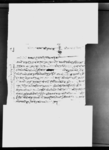A copy of a rukkā from King Raṇabahādura reconfirming Gosāī̃ Bhagavantanātha as central overseer of jogīs (VS 1839)
ID: K_0469_0008
Edited and
translated by Christof Zotter
Created: 2016-04-19;
Last modified: 2018-06-18
For the metadata of the document, click here
The accompanying edition, translation/synopsis and/or commentary are available under the terms of the Creative Commons Attribution-ShareAlike 4.0 International License
Abstract
In this rukkā King Raṇabahādura Śāha reconfirms the appointment of Gosāī̃ Bhagavantanātha as central overseer (maṇḍalāi) of jogīs and informs officials throughout the country that every household among specified groups shall pay one ānā as dastura. Furthermore, certain fines, fees and escheated property from the jogīs are assigned to the maṇḍalāi.Diplomatic edition
[1r]
⟪9⟫श्रीज्यूज्यूवावाश्रीवुवाज्यूश्रीभगव़न्तनाथ1⟪रुजुदुरुस्तले⟫1⟪सक्कलवमोजींनक्कलदुरुस्तछभनीसहीछापगर्ने2रानागाऊमठ्काडीट्ठातीलकवाहादुरचं⟫1स्वस्तिश्रीमन्महाराजाधीराजकस्यरुक्का¯ ¯ ¯ ¯ ¯ ¯ ¯
2आगेहाम्रामुलुकभरकाउमराद्वार्याअमालीदार्सभप्रतिआगेहाम्रा
3मुलुकभरकाउमराद्वार्याअमालीदार्सभप्रति•हाम्रामुलुकभरिमा
4हाजोगीकोमंडलाई⟪¯ ¯ ¯ ¯⟫जीकनजीकन¯ ¯ ¯ ¯ ¯ ¯ लेचर्हाय़ाकोरहेछ
5सोहीवमोजीमहामीलेपनीचह्राईउ•तसर्थमाझी•कुम्हाल•दरवै़
6दनुव़ार•नेव़ार्याकुह्माल•कुसल्या•थारु•जोलाहा•पहरिकुसह
7रि•थामि•हायु़•सुनुव़ार•चेवाङ्•एतीजातकाघरहीऐकएक्आना
8दस्तुर•दीनु•साँजव़ीहान•षानदीनु•जोगीकाषतछीतदंडकुंडमोरो
9अपुताली•महा•षतछीतको•जोगिको•टीकोअंवलीकोएसहीसा
10वसग•अंवलीलेतीराइदीनु•वीतलपमाहापनी•वीतलप्यालेतिरा
11इदिनु•जोछेकथुन्गर्लासोअप्सरीय़ाहोलाईतीसम्वत१८३९साल
12ज्येष्ठवदी३०रोज१मुकामकांतीपुरशुभ्म्¯¯¯¯¯¯¯¯¯¯¯¯¯¯¯¯
Translation
[1r]
91
Venerable Grandfather [and] Venerable Father
Venerable Bhagavantanātha
Attested as correct2
Assenting that the copy is in accordance with the original, the ḍiṭṭhā of Rānāgāũ Maṭha Tīlaka Bāhādura Cã3
Hail. [This is] an executive order of the supreme king of great kings.
[Regarding] the following: To all umarāus, dvāres, [and] amālīdāras throughout our realm (muluka)
The office of central overseer (maṇḍalāi) of jogīs was offered4 to --- 5 -jī by [our] --- 6 . Accordingly, we, too, have offered [him the office]. Therefore, every house of the [following] groups (jāta): mājhīs, kumāles,7 darāis (text: daravai), danuvāras, nevārakumāles, kusles, thārūs, julāhās, paharīs, kusaharis, thāmīs, hāyūs, sunuvāras [and] cepāṅs (text: cevāṅ)8 shall give one ānā [to you for Bhagavantanātha and his order] as a customary fee (dastura) [and] offer food [to the jogīs] morning and evening. The amālis shall arrange [the money] to be paid [relating to] jogīs' illicit sexual relations (khatachita), 9 [other] fines, escheated property (i.e. the property of jogīs who die childless), the mahākhatachita10 [and] the jogīs' ṭiko11 according to the amāli (text: aṃvalī) rates 12 for these. 13 In the bitalapa, too, [the tenants]14 should be made to pay by the bitalapa holder (bitalapyā). He who obstructs [this arrangement] will be [considered] a rebel (apsariyā).
Sunday, the 30th of dark fortnight of Jyeṣṭha of the [Vikrama] era year 1839 (1782 CE), residence Kathmandu. Auspiciousness.
Commentary
For other documents relating to the maṇḍalāi of Bhagavantanātha, see DNA_0014_0050, K_0469_0009 and K_0469_0010.

